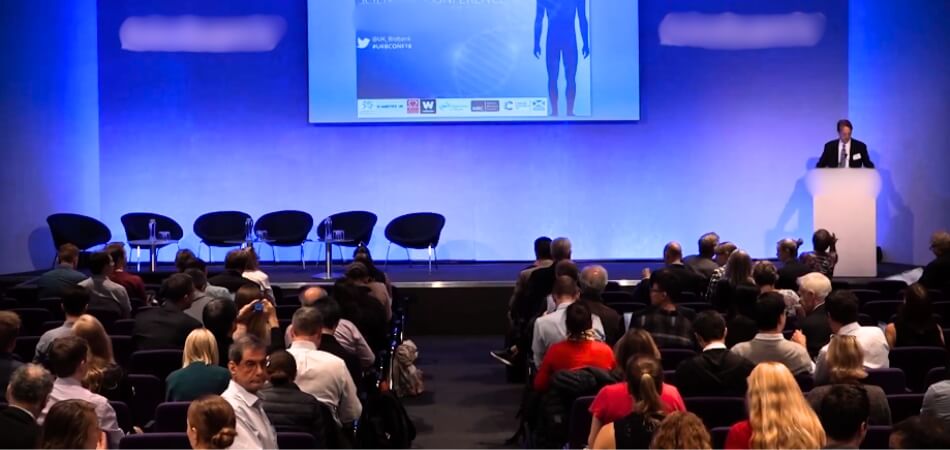Scientific conferences are invaluable events where researchers, scholars, and professionals share their latest findings, discuss innovations, and network with peers. If you’re wondering how to find an appropriate scientific conference, the process involves several strategic steps.
Start by exploring conference organizer websites like Global Conference Alliance Inc. and using your academic networks. Monitor social media for relevant groups and hashtags, and stay updated through journals and publications. Seek recommendations from peers, check university bulletin boards, and visit reputable conference organizer websites.
Consider the location, topic, and objectives, and be cautious of predatory conferences. By following these guidelines, you’ll be well on your way to finding the perfect conference. Read on for a detailed guide to each step.
What Happens at A Scientific Conference?
Attending a scientific conference is a vibrant experience filled with opportunities for learning, networking, and sharing research. Typically, the event kicks off with an opening session where keynote speakers set the tone, often presenting innovative research or insights in their field.
Throughout the conference, you’ll find a range of presentations, panel discussions, and poster sessions. Presenters share their research findings, which can range from innovative studies to new methodologies. This is a great opportunity for you to engage with the latest developments and ask questions directly to the researchers. It is good to know that the international scientific conferences in Canada 2024 can serve as inspiration for the development of new ideas due to the various topics that will be discussed.
Networking is a key aspect of scientific conferences. You’ll meet fellow scientists, researchers, and industry professionals, creating connections that could lead to collaborations or mentorships. Coffee breaks and social events are perfect moments to strike up conversations and exchange ideas in a more relaxed setting.
Additionally, many conferences offer workshops and seminars where you can gain insight into specific topics or skills. Whether it’s learning data analysis techniques or learning about grant writing, these sessions contribute to your professional development.
There’s often a sense of community at these gatherings. Sharing your passion for research with like-minded individuals creates an inspiring atmosphere. A scientific conference is not just an event; it’s a chance to grow, learn, and connect with your scientific community.
Qualities of Good Scientific Conference
A good scientific conference can be extremely beneficial, offering a wealth of knowledge and networking opportunities. But what exactly makes a scientific conference worth attending? Here are the key qualities that set the most impressive ones apart:
- A diverse speaker lineup ensures a wide range of perspectives and expertise. Attendees benefit from hearing different viewpoints and research approaches.
- The well-organized schedule allows for smooth transitions between sessions. This ensures attendees maximize their learning and networking time.
- High-quality presentations and posters highlight the latest research. These sessions inspire attendees and promote academic and professional growth.
- Interactive workshops provide hands-on learning experiences. Participants gain practical skills they can apply in their work.
- Ample networking opportunities encourage collaboration among attendees. Social events, breaks, and informal discussions help build valuable connections.
- A supportive atmosphere promotes open discussion and idea sharing. Attendees feel comfortable asking questions and engaging in debates.
- Accessible locations and facilities improve the overall experience. Convenient venues make attending easy and enjoyable for everyone.
How to Find an Appropriate Scientific Conference?
Finding the right scientific conference can be invaluable for your research and career. With so many options available, choose one that aligns with your goals, research interests, and professional development plans. Here’s a step-by-step guide to let you know, how to find an appropriate scientific conference.
Step 1: Explore Online Databases
Look for websites like Global Conference or other specialized platforms that list upcoming scientific events. These databases are categorized by field, location, and date, making it easy to filter and find conferences that match your research area. They also provide detailed information about speakers, topics, and submission deadlines, so you can assess if it’s the right fit for you.
Step 2: Utilize Academic Networks
Make use of the academic networks within your institution or research group. Many universities and professional organizations send out internal announcements about relevant conferences. Reaching out to advisors or colleagues in your department can also provide valuable insights into conferences that they’ve attended, which could be beneficial for you as well.
Step 3: Monitor Social Media Platforms
Social media is a powerful tool for staying updated on conferences. Follow academic influencers and groups on platforms like Twitter and LinkedIn. Search for specific hashtags like #ScientificConference or #ResearchEvent to discover upcoming conferences in your field. Engaging with these communities also helps you stay informed about lesser-known but highly relevant events.
Step 4: Review Journals and Publications
Academic journals in your field often announce conferences, special symposiums, or workshops related to published research. Subscribing to these journals or regularly visiting their websites can help you catch announcements about key events. This can be especially helpful if you’re looking for specialized conferences that align with your niche research topic.
Step 5: Seek Peer Recommendations
Your peers are one of your most reliable resources. Ask your colleagues, both locally and internationally, about conferences they have attended or are planning to attend. They can provide first-hand experiences, reviews, and even tips on navigating specific events, helping you make a more informed decision.
Step 6: Check University Bulletin Boards
Even in a digital age, physical bulletin boards and newsletters in your department or university are still valuable sources of information. Keep an eye on these boards, as many professors and research groups post flyers or notices about upcoming conferences that may not be widely advertised online.
Step 7: Visit Conference Organizers’ Websites
Reputable conference organizers maintain extensive listings of their upcoming events. Their websites usually provide comprehensive information on topics, registration, and key deadlines. Visiting these sites directly ensures you’re getting accurate and up-to-date details.
Step 8: Consider Key Factors
Once you’ve found a few potential conferences, evaluate them based on location, topic, audience, and objectives. Think about how the event aligns with your personal and professional goals. Does it offer networking opportunities? Are the topics relevant to your research? These factors will help you prioritize which conferences to attend.
Step 9: Beware of Predatory Conferences
Unfortunately, not all conferences are legitimate. Use resources like the Think Check Attend checklist to verify if a conference is credible. This tool helps you avoid predatory events that may exploit researchers for registration fees without offering meaningful professional development.
By following these steps, you’ll be well-equipped to find a scientific conference that’s perfectly relevant to your research and professional goals. Remember that finding scientific conferences can be a rewarding journey that opens doors for collaboration, learning, and networking within your field.
Why Should You Participate in A Scientific Conference?
Participating in a scientific conference can be a highly rewarding experience, offering numerous professional and personal benefits. Whether you’re a seasoned researcher or just starting, attending these events can significantly impact your career. Here are some reasons why you should participate in a scientific conference.
Expand Your Knowledge
Scientific conferences are prime venues for learning about the latest research and innovations. Attendees gain insights into emerging trends and techniques. This knowledge can directly enhance your own research and professional practice.
Experts from various fields share their findings, providing a broad perspective. Engaging with diverse topics enriches your understanding of your discipline. Conferences stimulate intellectual curiosity and inspire new research ideas.
Network with Peers
Conferences provide amazing opportunities to connect with peers and leaders in your field. Networking can lead to valuable collaborations and friendships. These connections often open doors to future research opportunities and career advancements.
Meeting peers face-to-face enables stronger professional relationships. Personal interactions can lead to mentorship and guidance. Conferences offer an environment conducive to building meaningful professional networks.
Present Your Research
Presenting at a conference allows you to showcase your work to a relevant audience. It provides a platform for receiving feedback from experts. This feedback can be instrumental in refining your research and improving your methodologies.
Sharing your findings improves your visibility within the scientific community. It positions you as a thought leader in your field. Presentation experience also hones your communication skills and boosts your confidence.
Gain Inspiration
Attending conferences can be a source of inspiration and motivation. Listening to renowned speakers and witnessing innovative research energizes attendees. This inspiration often translates into renewed passion and creativity in your own work.
The lively environment of a conference fosters a spirit of discovery. Seeing the achievements of others can ignite new ideas. Conferences remind you of the bigger picture and the impact of your research.
Stay Updated
Keeping up with the latest developments in your field is crucial. Conferences provide an in-depth update on advancements and trends. Staying informed helps you remain competitive and relevant in your discipline.
Updates on emerging technologies and methodologies are particularly valuable. Conferences ensure you are aware of the latest tools and resources. This knowledge enables you to apply innovative techniques in your research.
Tips to Help You Build Your Network at A Scientific Conference
Building a network at a scientific conference can greatly improve your professional growth. By connecting with peers, you open doors to collaborations, mentorships, and career opportunities. Here are some effective tips to help you build your network at a scientific conference.
- Research attendees and speakers ahead of time. Knowing who will be there allows you to effectively target key connections.
- Attend social events and informal gatherings. These settings provide relaxed environments for initiating conversations and building relationships.
- Be proactive in introducing yourself to new people. Don’t hesitate to approach others; most attendees are also looking to network.
- Be mindful of the cost of scientific conferences; budget accordingly to attend key events. Investing in the right conferences can yield significant networking benefits.
- Bring plenty of business cards to exchange. This simple act facilitates follow-up communication after the conference ends.
- Join relevant workshops and breakout sessions. These smaller groups offer more intimate settings for meaningful interactions.
- Utilize social media to connect with attendees before and after the event. Platforms like LinkedIn are excellent for maintaining professional relationships.
- Engage in discussions during Q&A sessions. Asking insightful questions can make you more memorable to both speakers and fellow attendees.
- Offer to collaborate on projects or research. Expressing genuine interest in others’ work can lead to future partnerships.
- Follow up promptly with new contacts. Send a friendly email or connect on LinkedIn to keep the conversation going.
Frequently Asked Questions (FAQs)
Finding the right scientific conference can be a crucial step in advancing your research and career. Here are a few frequently asked questions to help you get through this process effectively.
What Role Do Academic Networks Play in Discovering Conferences?
Academic networks within your institution or affiliated organizations often share information about relevant conferences. Tapping into these networks can provide insights and recommendations from trusted colleagues and mentors.
How Can Social Media Platforms Assist in Locating Conferences?
Platforms like Twitter and LinkedIn have specialized groups and hashtags focused on conferences. Following these channels keeps you updated on the latest events and provides a platform for engaging with the scientific community.
Why Should I Check Journals and Publications for Conference Announcements?
Journals and publications in your field often announce conferences and special issues. Keeping an eye on these sources ensures you stay informed about important events related to your research area.
How Valuable Are Peer Recommendations When Choosing a Conference?
Peers and colleagues can offer firsthand insights into conferences they’ve attended. Their recommendations can help you find high-quality events that are worth your time and resources.
What Precautions Should I Take to Avoid Predatory Conferences?
Use tools like the Think Check Attend checklist to verify the legitimacy of conferences. Be wary of events with unclear organization details or unusually high fees, ensuring you choose reputable and beneficial conferences.
Bottom Lines
Science conferences offer invaluable opportunities for learning, networking, and professional development. By leveraging online databases, academic networks, and social media, you can discover events that align with your interests.
You should consider factors like location, topic, and objectives to ensure the best fit. Remember to stay vigilant against predatory conferences by using tools like the Think Check Attend checklist.
Building a network through proactive engagement and follow-up can significantly improve your conference experience. By knowing how to find an appropriate scientific conference, you can make informed decisions and maximize the benefits of these enriching events.








